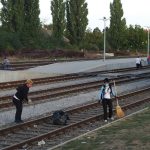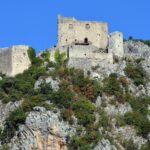The latest from the migrant crisis in Croatia.
A new wave of about 5,500 refugees, completely exhausted after several days spent on the road due to shipping strike in Greece, has passed through the winter transit centre in Slavonski Brod on Sunday. During the next several days, 6 to 8 daily trains from Šid are expected to arrive in Slavonski Brod, and after a short stay there they will continue their journey to Slovenia. The police do not expect any particularly tense situations, reports Vecernji List and Jutarnji List on November 10, 2015.
“Six trains bring in the refugees every day, and if necessary we can add another train. We can always hold them a bit in the camp”, Croatian Interior Minister Ranko Ostojić said. According to him, the aim of the agreement achieved between the leaders of the European Union was to slow down the inflow in the case of contingencies, in accordance with the capacity of Germany to admit them.
From midnight to 9 am on Tuesday, 2,131 migrants entered Croatia. At the winter reception centre in Slavonski Brod, there are currently 2,170 migrants. Since the beginning of the migration crisis, 350,124 migrants and refugees have entered Croatia.
Slovenia will soon begin to implement more stringent measures on its border with Croatia to control the refugee flow, and possibly put up a fence on a part of the border to better control the expected new wave of refugees from Greece via the “Balkan route”. Slovenian Prime Minister Miro Cerar is expected to talk about it on Tuesday.
Cerar government discussed the plans at its extraordinary session on Monday night, with Foreign Minister Karl Erjavec pointing out the large wave of 30,000 people moving from Greece. After the meeting, the government in a press release stated that, due to a large immigrant wave which could come to Slovenia midweek, it had adopted additional measures to control migration flows and to protect the southern Schengen border.
“The future of Europe will depend to a large extent on the German approach to the refugee crisis, and other European countries must show more solidarity in order to jointly deal with this historic challenge”, president of the European Council Donald Tusk said on Monday.
Europe is faced with one of its biggest challenges since the World War II, and Germany will this year admit most of one million refugees and migrants who come to Europe from poor and war-affected countries of Asia and Africa.
German Chancellor Angela Merkel earlier this year called for opening the doors for the arrival of refugees fleeing the conflict in the Middle East. Her policy was welcomed at home and abroad, but in the meantime the influx of migrants continued and German capacities for accommodating new refugees are nearly full.
Tusk described German Chancellor Merkel as the embodiment of Europe’s virtues. “Those who believe that Germany is too open, too tolerant, too liberal, they forget to learn the lessons of our tragic history”, said Tusk, who is a former Polish Prime Minister. “Do you want Germany that is open, tolerant, considerate, which is the Germany of Angela Merkel, or do you want Germany that is closed, cold and ruthless? There is only one answer to that question”, said Tusk.








